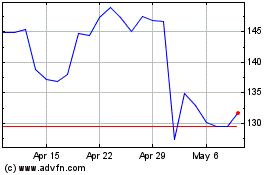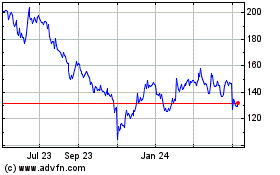Millennials Change the Complexion of the Beauty Business
May 03 2016 - 7:45PM
Dow Jones News
By Sharon Terlep
The latest results from Estée Lauder Cos. and Coty Inc. exposed
a shift in the beauty business: Millennials aren't willing to
invest in expensive skin creams that have been big profit drivers.
Instead, younger consumers want products that provide more
immediate results.
"Millennials are much more about immediate results than saving
for the future," Estée Lauder CEO Fabrizio Freda said in an
interview. "The 30-year-old today gets more photographs of
themselves in a day than their mother did in a year, so they care
about what their skin looks like now, not when they are 40."
The shift threatens revenues of companies that have long
depended on anti-aging products with names like "Hope in a Jar" and
"Repairwear Laser Focus" to drive sales. "There is nothing in the
industry more profitable than skin care," said Deutsche Bank
analyst William Schmitz.
Shares of Estée Lauder fell 4% to $93.29, while Coty tumbled
8.7% to $28.35 at the end of trading on Tuesday in New York.
Millennials, people born in the 1980s and 1990s, are an
important demographic that consumer-products companies are trying
to figure out. The group comprises about one-quarter of the U.S.
population and last year eclipsed baby boomers as the largest
generation.
In the U.S., sales of anti-aging products such as serums and
face creams rose just 2% last year to $3.6 billion, according to
Euromonitor. Meanwhile, makeup sales climbed 8% to $5.1
billion.
The trend weighed on Estée Lauder's financial results for its
fiscal third quarter, the company said Tuesday. Sales of skin-care
products, particularly its Estée Lauder and Clinique brands, fell
2.5%, while the rest of the business notched gains. Makeup sales
rose 7.3%, driven by growth in MAC, Smashbox and Tom Ford. Currency
fluctuations offset gains throughout the company.
Overall, revenue at Estée Lauder fell 9% in the three months
ended March 31 to $4.9 billion. Earnings dropped 62% to $369
million because the results didn't includes gains from
divestitures.
Coty, whose brands include OPI and Philosophy, on Tuesday
reported that sales fell 9% for its skin and body-care unit, while
cosmetic sales rose 11%. The company posted a $26.8 million
quarterly loss as acquisition-related expenses offset a 1.8%
increase in sales to $950.7 million.
The company spent $1 billion to buy a Brazilian beauty products
business in February. It also has agreed to pay $13 billion for
CoverGirl and dozens of beauty brands from Procter & Gamble
Co.
Coty interim Chief Executive Bart Becht said younger buyers also
have different shopping patterns preferring to buy beauty products
online, as well as being more drawn to less mainstream brands.
"Generally they are looking for more natural products and more
authentic brands," he said.
Procter & Gamble has struggled to revitalize its sagging
Olay skin-care brand. The company recently eliminated a sixth of
its Olay products, discontinuing items such as acne washes, facial
scrubs and skin treatments that didn't fit with the brand's
antiaging message or weren't selling well.
Despite the tweaks, Olay sales fell again in the March quarter,
the company said last week.
"Instead of trying to fix it, they are saying, 'I'll just cover
it up,'" Deutsche Bank's Mr. Schmitz said of younger shoppers.
He said millennials favor makeup, such as concealers and
flesh-toned powders and creams, which give the appearance of
sculpted cheekbones, nose and chin.
(END) Dow Jones Newswires
May 03, 2016 19:30 ET (23:30 GMT)
Copyright (c) 2016 Dow Jones & Company, Inc.
Estee Lauder Companies (NYSE:EL)
Historical Stock Chart
From Mar 2024 to Apr 2024

Estee Lauder Companies (NYSE:EL)
Historical Stock Chart
From Apr 2023 to Apr 2024
